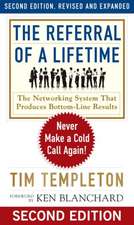Perfect Phrases for Communicating Change
Autor Lawrence Polsky, Antoine Gerschelen Limba Engleză Paperback – 16 mar 2010
Employees respond to organizational change with worry, fear, and sometimeseven panic. Your job is to keep them motivated and focused—so you mustchoose your words carefully during times of upheaval.
Perfect Phrases for Communicating Change has hundreds of ready-to-use phrasesfor ensuring your employees make the transition with clarity, commitment, andskill. Learn the most effective language for:
- Articulating new company initiatives
- Responding to questions with confidence
- Easing employees' fears
- Clarifying roles and responsibilities
- Addressing resistance and performance problems
"Perfect Phrases for Communicating Change is a wonderful book, filled with practical, solid advice, suggestions, and examples for how to communicate effectively in a time of change.”
John Krajicek, Executive Professor and Assistant Director of Business Communication Studies, Texas A&M University
"Communication during organizational change is everything. The right words at the right time can make all the difference between a successful and unsuccessful change initiative. This is a wonderful resource for finding the right words and sentiments to convey any type of change."
Robert J. Marshak, Ph.D., author of Covert Processes at Work: Managing the Five Hidden Dimensions of Organizational Change
“Finding the right words to communicate change is challenging, even for the best of managers. In this user-friendly text, Lawrence and Antoine provide hundreds of practical phrases to better prepare managers for the task. The book is rich with insightful suggestions on change messaging considerations and construction.”
Edward Ferris, Assistant Professor, The New School for Management and Urban Policy
"In my over 20 years of running companies and corporate divisions I have seen a direct correlation between the quality of communication of my managers and their success in the business world. If you aspire to be an effective, efficient, and productive leader then I highly recommend this book. It is an outstanding reference guide and road map for pragmatic yet inspirational communication techniques."
Mitch Pisik, President and CEO, Breckwell Products
Preț: 78.80 lei
Preț vechi: 87.37 lei
-10% Nou
Puncte Express: 118
Preț estimativ în valută:
15.08€ • 15.74$ • 12.48£
15.08€ • 15.74$ • 12.48£
Carte tipărită la comandă
Livrare economică 04-15 aprilie
Preluare comenzi: 021 569.72.76
Specificații
ISBN-13: 9780071738316
ISBN-10: 0071738312
Pagini: 176
Dimensiuni: 130 x 203 x 10 mm
Greutate: 0.17 kg
Editura: McGraw Hill Education
Colecția McGraw-Hill
Locul publicării:United States
ISBN-10: 0071738312
Pagini: 176
Dimensiuni: 130 x 203 x 10 mm
Greutate: 0.17 kg
Editura: McGraw Hill Education
Colecția McGraw-Hill
Locul publicării:United States
Cuprins
Part One: Foundations of Communicating Change
In this section we would outline Best Practices from research and experience for communicating change such as:
- The critical communication challenges in each phase of change: Launch, Execution, Sustain
- Balancing the 3 elements of change communication: Information, Emotion & Action
- 5 most common mistakes leaders make when communicating change
- An easy to use checklist to review any message before sending (written or verbal)
In this section we would outline Best Practices from research and experience for communicating change such as:
- Make it Simple
- Empathize
- Personalize Messages
- Tell the truth
- Communicate, Communicate, Communicate
- Link to Business
- Avoid Wishful Thinking
- Create 2 way communication
- Announcing Change
- Responding to Questions
- Overcoming Fear
- Creating Urgency
- Addressing Loss of Power / Status
- Career Discussions
- Clarifying Roles & Responsibilities
- Handling Resistance
- Communicating Change Goals
- Coaching around Emotions
- Coaching around Skill
- Empowering Employees
- Keeping People Motivated
- Recognizing Success
- Addressing Performance Problems
- Rallying Teams
- New Structure (i.e. Reorganizations, Layoffs, Outsourcing, Merger, New Teams)
- New Project (i.e. ERP and other Software Rollouts, Process Improvement, Innovation)
- New Leader (i.e. Succession, Merger/Acquisition, New Team Members)
- New Strategy (i.e. New Markets, New Corporate Positioning, New Products/Services)

















